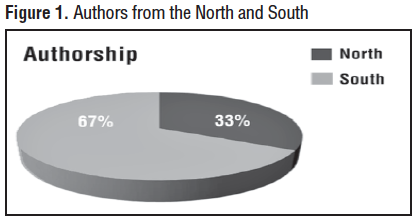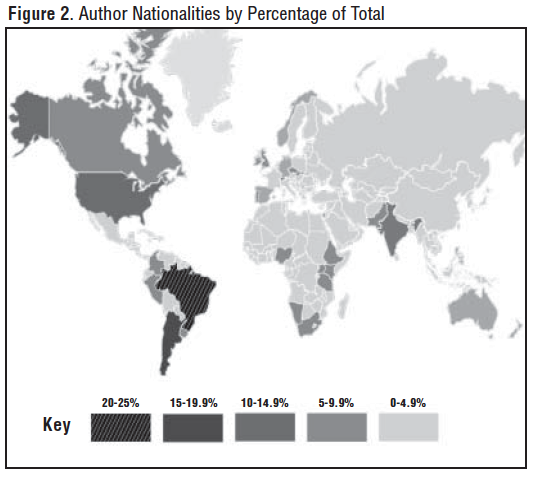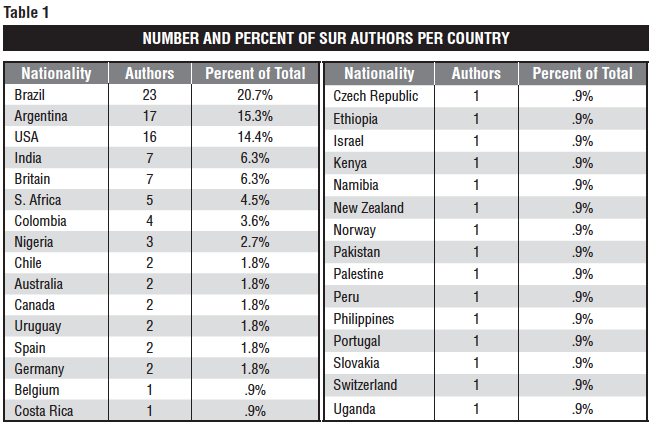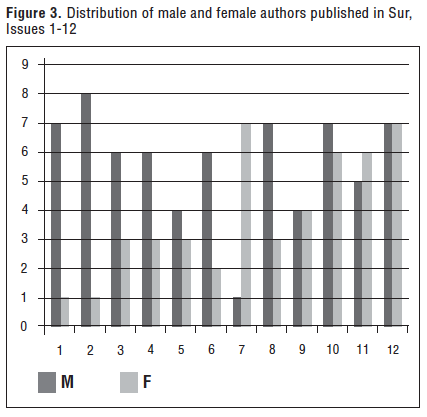On the occasion of the 10th anniversary of Conectas Human Rights, we remember with pride that our journal is also nearly eight years old, during which time we have edited and published fifteen biannual issues. Looking back over these eight years, it occurred to us that it might be useful to human rights activist groups – always eager to disseminate and discuss their points of view in a publication – for us to relate some of the successes, problems and difficulties we have encountered throughout our history.
Original in Portuguese. Translated by Barney Whiteoak.
Sur –International Journal on Human Rights was launched in 2004 to provide a channel of communication between academics and activists committed to the promotion and defense of human rights, with a particular emphasis on problems specific to the “Global South.” The journal was created to give a voice to authors from the South and to provide an intellectual arena where the perspectives of North and South could be critically analyzed and debated.
The concept of South, or Global South, is broad and not easily defined. After all, what is distinctive about the points of view of activists and academics from the South? What do so many countries with such diverse cultures and histories have in common?
To answer these questions, it is necessary to recall the political circumstances, in 2004, in which the journal was created. Most of the countries from the South had recently emerged from long years of totalitarian rule, when governments were characterized by, among other deleterious practices, disrespect for the human rights of their populations. The period when the journal was created was, for many countries in the South, one of transition to democracy in which the gap between laws and reality was still wide. The distribution of wealth continued to benefit small minorities. In most countries, civil society movements were pursuing the truth about the so-called “years of lead” and seeking punishment for crimes committed during the regimes. And – worse – in spite of redemocratization, many human rights were still being disrespected, particularly those of the poor. We were, therefore, in the South, a long way from the Rule of Law that existed in some countries in the North where the majority of academic journals dedicated to the discussion of human rights were published. These and other factors were distinctive to the struggle for human rights in the Global South and justified the creation of our journal.
Numerous meetings with academics and activists from Sur – Human Rights University Network, as well as research about the available journals, revealed that there was indeed an unfilled niche for an academic journal to provide this voice to the South. And, from the outset, we knew that to have a broad reach, the journal needed to be published in more than one language. We started with Portuguese and English, based on the assumption that Spanish language readers would be able to read Portuguese. However, we realized early on that a Spanish edition was necessary, and so the journal was published in three languages from its very first issue.
Another decisive factor in the creation of the journal was the need to establish a link between activists and academics, building a bridge between theory and practice in the field of human rights.
The results appear to confirm that our journal has filled a gap that was unoccupied and has met the needs of our readers. Currently, more than 2,000 copies (in the three languages) are distributed in over 100 countries, and we also publish an online version in all three languages.
A survey conducted with readers in 2007 revealed a broad acceptance and positive assessment by all readership categories (66% of readers considered the journal “excellent” and 34% considered it “good.” No negative responses were given.) (SUR, 2007, p. A5-A7).
As stated on the credits page of the journal, we have three boards for editing the Sur Journal:
• The Executive Board, which, together with the editors, is responsible for handling the editing process;
• The Editorial Board, formed by specialists closest to the journal who help select the topics and the reviewers;
• The Advisory Board, formed by specialists who may help select articles and who, in some cases, participate in the planning of the journal.
All the articles published in the journal come under the scrutiny of the Executive Board, which makes a pre-selection of the contributions to be submitted to the reviewers. Any suggestions or corrections, discussed with the authors, are incorporated into the final articles. This “blind peer review” process lends significant credibility to the publication.
It is important to note that all the contributions published by the journal are voluntary and non-remunerated. In order to expand the scope of our journal, from the seventh issue onwards, each new issue was edited in partnership with other institutions. As a result, the journal is now divided into two parts, one dossier dedicated to a topic specified in the call for papers and one general section consisting of contributions on other topics.
The choice of articles to be submitted to the reviewers and eventually published is made relative to the total number of contributions received for each issue. Therefore, the judgment is not absolute and depends on the quality of the other articles received for the same issue. Rejected articles will only be reserved for publication in subsequent issues in exceptional cases involving contributions that are highly original, politically relevant or that have other qualities that set them apart.
In addition to the essential criterion of editorial quality, our choice takes into account geographic and gender criteria, favoring an equitable distribution and giving preference to authors from minority or vulnerable groups. Another important criterion for selecting articles is an approach from different disciplines, in an attempt to overcome the supremacy of law in the discussion of human rights.
Annex No1, a study by Laura Baron entitled “Voices of the South: Authors, Nationalities and Topics,” gives a good idea of the consequences of our selection criteria on the distribution of authors, nationalities and topics in our journal (from issue No. 1 to No. 12)
In addition to the geographic distribution of the authors that is tabulated by the research in Annex 1, the research published in the seventh issue of SUR presents the results of a survey conducted in 2007 that, although not recent, gives a fairly accurate description of the composition of our readership. Just as we proposed, SUR is read equally by academics and activists (36.8% are university professors and 31.2% work for NGOs) (SUR, 2007, p. A5).
To attract new readers, the indexing of the journal in academic and commercial databases has grown increasingly important, since it is through these databases that the journal has become more widely known. SUR is covered by the following indexing services: IBSS (International Bibliography of Social Sciences); DOAJ (Directory of Open Access Journals); Scielo and SSRN (Social Science Research Network). The journal is also available at the following commercial databases: EBSCO and HeinOnline. Only scientific journals with a good reputation and high intellectual standard are accepted by these databases and SUR’s “A” rating in Colombia and “A2” rating in Brazil (Qualis) have almost certainly contributed to inclusion of the journal in such venues.
Achieving a print run of 2,700 copies and a distribution in more than 100 countries should be considered a good result. Our numbers would no doubt be worse if we had been forced, due to financial pressures, to charge readers either for individual issues or subscriptions. By protecting our mission to promote the voice of the South, we have managed – thanks to the understanding of our sponsors – to distribute the journal free of charge to interested readers.
Meanwhile, another important decision related to how the journal reaches our readers has concerned print versus online publishing. There were strong currents of opinion claiming that our readership has access to the internet and, therefore, that a printed publication was unnecessary – an online publication would suffice, resulting in substantial savings in printing and mail expenses (approximately 50% of total costs). To guide our decision, we surveyed our readers of both the printed journal (inserting a questionnaire) and the online version. The results were conclusive: more than 77% of the readers expressed a preference for the printed format. Accordingly, our distribution policy is based on two pillars: the journal being free of charge, and published in both printed and online format. We feel sure that the abandonment of either of these two pillars would result in a significant loss of readership.
Another important factor that would impact the scope of our readership is the addition of French to the three languages in which the journal is already published. The lack of a French language publication practically precludes our access to half of Africa, in addition to barring us from one of the leading centers of cultural and political production in the Western world. The inclusion of French, therefore, would immediately increase our scope and give an important boost to the quality and variety of our focus. The only thing preventing us from taking this step are financial considerations.
Obviously, the problem of costs is an essential part of any enterprise. The challenge consists of not abandoning essential objectives in the pursuit of savings. This is not easy. The following are some of the approaches that have worked well for us:
• Partnership with organizations that are committed to the same cause in order to produce individual issues of the journal. As such, we have co-produced issues with the ICTJ (International Center for Transitional Justice), ABIA (Brazilian Interdisciplinary AIDS Association), UNHCR (Office of the United Nations High Commissioner for Refugees), ESCR Net (International Network for Economic, Social and Cultural Rights) and Amnesty International. The following organizations have also contributed to the promotion and selection of articles: ISHR (International Service for Human Rights), the Federal University of Rio Grande do Sul, CELS (Center for Legal and Social Studies) and the Center of Human Rights of the University of Pretoria;
• Longer partnerships like those we have sealed with the Carlos Chagas Foundation, which will fund four issues of the journal, as well as serve on the Executive Board and participate in the coaching program, which will be described further in what follows;
• Gather expressions of recognition from various institutions demonstrating the importance and penetration of the journal;
• Promote special issues in other languages. For example, the Egyptian university organization Partners in Development, in cooperation with SUR, published a special issue in Arabic containing articles translated from the journal and also original contributions from a joint seminar held in Cairo. A similar issue in Chinese is currently being considered, in collaboration with Wuhan University;
• Partnership with universities to check and correct translations, like the one with the University of Texas, in Austin, to proofread translations into English.
For each issue of the journal, we receive an average of 80 submissions, but due to space limitations we can choose only 8 or, at the very most, 9 articles. Obviously, many of the rejected articles are of good quality and were only refused because they were submitted to us together with others that we deemed better. However, many of the contributions we receive are uneven: they have qualities (such as originality and political relevance) but also shortcomings (such as disorganization, lack of a logical order, incomplete bibliography, etc.). To address this matter, we have developed, together with the Carlos Chagas Foundation, the Program to Encourage Academic Production in Human Rights (that we informally call “coaching”). The idea of this program is for experienced authors to provide support to young authors from the South, helping them improve and in some cases rewrite the articles they submit.
The first selection of articles for the program was made in the second half of 2011 and, in light of the results, a second selection may occur in 2012 (see Annex 2, Notice of the Program to Encourage Academic Production in Human Rights).
How can a small, practically unknown organization like Conectas was in 2004, when the journal was founded, have achieved this success? SUR has grown and consolidated, has a loyal readership, enjoys the support of numerous reputable organizations and is frequently cited in scientific papers.
The most obvious explanation is that, when it was launched, the definition of the niche to be filled was correct: there was indeed a need to give a voice to the South and this voice did not have the right vehicle to express itself.
This was in 2004. Today, seven years later, the political and economic world has changed. The South is increasingly an “emerging” force. The North, meanwhile, is losing its clout, including its soft power, and it visions of the world no longer predominate. New visions are surfacing that will undoubtedly affect the conceptualization and the struggle for human rights. The future of Sur Journaldepends on us being able to understand and interact with this new reality.
This annex is a reduced version of a study prepared by Laura Baron, a student at Barnard College in New York who worked as a volunteer at Conectas Human Rights during June and July 2011.
This study looks at the first 12 published issues of Sur. Since its launch in 2003, the journal has published over 160 articles, written by 117 authors from over 30 countries around the globe. In the following pages, the study examines the breakdown of authorship in regards to nationality and gender.
Sur Journal aims to expand and strengthen the international network of human rights communication, with an emphasis on the voices of authors from the Global South. In looking at the demographics of the published authorship, this study analyzes the efficacy of efforts to compile varied voices towards the publication of an insightful and comprehensive journal. The following information shows the extent of Sur Journal’s networks, as well as the scope of nationalities that SUR has not yet published.
The graph below ( Figure 1. ) shows the ratio of authors from the Global North and South. In Issues 1 through 12, 67% of authors published in Sur hold nationalities from Southern countries, while 33% hold Northern ones. These figures do not include the issue in Arabic released in collaboration with the Egyptian organization Partners in Development which comprises 12 articles from authors from the Arab world.

Figure 2 shows the distribution of Sur authors by nationality, displaying the gradient of author nationalities by percentage. The highest grouping of nations is that to which 20-25% of Sur authors hold citizenship, shown in the darkest shade. The groups are shown in descending order and coded on the map, with the nations represented in lighter shades indicating lower amounts of authorship. Countries shown in the lightest shade are those from which Sur has not yet published authors.
The map in Figure 2 provides a visualization of some of the strengths and weaknesses of Sur’s networks. The journal has published extensively articles written by authors holding nationalities of several countries of Latin America, primarily from Brazil and Argentina. However, many nations in Asia and Africa have been published with little or no frequency.

Table 1 provides a numerical summary of the information shown graphically in Figure 2 . The countries in which authors who have contributed to SUR hold nationality are shown alongside the number of contributors from that country and the percent of total SUR authors that they represent.

Figure 3 displays the distribution of male and female authors who have been published in the first 12 issues of Sur. Over the eight years since the launch of SUR , the journal has moved towards a more equitable gender ratio in its authorship. While the first issue published a 7:1 ratio of male to female authors, the issues 8 through 12 have published an equal average of male and female authors.

• Sur Journal aims to disseminate the voices of authors with an emphasis on those from the Global South, while including articles contributed by authors from the North as well. SUR upholds this aim by publishing a 2:1 ratio of Southern and Northern authors.
• Sur Journal aims to build strong networks of human rights communication among nations of the Global South. SUR has published the work of authors from 31 countries of the world, bringing voices from South America, Asia, Africa, Europe, Australia, and North America into the publication. However, over 50% hold nationalities of Brazil, Argentina, the United States, India, and Britain. Looking at Latin America, Africa, and Asia, authorship nationalities are 44%, 10.8%, and 9.9% of total Sur contributors, respectively. The analysis shows areas of the Global South from which SUR has not published authors, especially in large regions of Africa and Asia.
• Since its commencement, SUR has narrowed a gender gap that held a 7:1 ratio in its first issue and has reached far more balanced proportions of male and female authors. In Issues 8-12, SUR has published an equal average of male and female authors.
Conectas Human Rights and the Carlos Chagas Foundation announce the Program to Encourage Academic Production in Human Rights for young Brazilian human rights researchers and advocates. By providing training in academic writing and argumentation, the program supports innovative and consistent article proposals that contribute to the field of human rights.
The purpose of the program is to give young authors the opportunity to write an original academic article (on the topic “human rights”) under the individual supervision of a tutor (specialist). Another intention of the program is for the completed article to be submitted to the Editorial Board of Sur – International Journal on Human Rights – published by Conectas – and, if approved, published in the following issue.
The objective of this program, therefore, is to permit rich empirical experiences and theoretical findings relevant to the field of human rights to be published and publicized, in order to contribute to the democratization and diversification of the production of knowledge in Brazil.
The selected authors may participate in the 12 th International Human Rights Colloquium (organized annually by Conectas), to be held in the second half of 2012.
The program is aimed at young human rights researchers and advocates in Brazil. Candidates must have a higher education diploma.
The competition is open to all disciplines, provided the article proposal addresses the topic of human rights.
The article proposals must be original and individual, so co-authored proposals are not eligible to compete for tutorship.
Only one proposal per candidate may be submitted.
The program will consider various topics within the field of human rights, such as:
• Human Rights and the Environment
• Human Rights of Women
• Rights of Persons with Disabilities
• Rights of Migrants and Refugees
• Development and Human Rights
• Responsibility of Companies
• Economic, Social and Cultural Rights
• Democracy and Human Rights
• Public Security and Human Rights
• Implementation on the National Level of International Human Rights Parameters
• Torture Prevention
• Strategic Human Rights Litigation
• Accountability of Human Rights Organizations
• Regional Human Rights Systems
• UN Human Rights Protection Mechanisms
• Sexual and Reproductive Rights
• Human Rights and Racial Discrimination
It is worth pointing out that the topics listed above are only suggestions. In other words, proposals may address other issues, provided they belong to the broad field of human rights.
Anyone residing in Brazil with a higher education diploma may submit article proposals. There is no specific application form, but each proposal must contain:
1. Extended abstract: a brief presentation of the topic and a summary of the primary arguments and hypotheses to be developed in the article. The extended abstract should contain a title and be no longer than two pages, in Times New Roman, 12 point font size and 1.5 line spacing;
2. Structure of the article to be written: an outline of the organization of the sections that will make up the article, summarizing very briefly what is to be addressed in each one. This should be no longer than one page, in Times New Roman, 12 point font size and 1.5 line spacing;
3. Bibliographical references: a list of the works used to prepare the extended abstract and the main works that will be used to write the article. This list (in alphabetical order) should be no longer than one page, in Times New Roman, 12 point font size and 1.5 line spacing;
4. Short resume: resume of education, professional activities and any published writings. The resume should be no longer than one page.
Applications should be sent by email to tutoria.sur@conectas.org by 30/10/2011.
Only article proposals in Portuguese will be accepted.
The selection of the proposals will be made by a Selection Commission formed by specialists. The selected applicants (6 at most) must submit the preliminary version of their article within 3 months and the final version a month later.
The tutors will be specialists in human rights selected based on the topics addressed in the selected proposals. The program requires tutors to keep close track of the construction and development of the candidate’s article.
The tutor has the authority to decide whether the final version of the article should be submitted to the Editorial Board of Sur – International Journal on Human Rights.
One of the primary objectives of the program is to publish the articles written under the supervision of the tutors in Sur – International Journal on Human Rights . Nevertheless, the final version of the article will only be published if it is approved by the Editorial Board of the journal.
It is important to emphasize that the article written by the candidate, if it is approved by the tutor, will be submitted with precedence to the Editorial Board of Sur Journal. Therefore, the article may only be published in another journal with the express consent of the Editorial Board of Sur Journal.
09/15/2011
OPENING OF CALL FOR PROPOSALS
10/30/2011
CLOSURE OF CALL FOR PROPOSALS
11/30/2011
ANNOUNCEMENT OF SELECTED PROPOSALS
02/29/2012
SUBMISSION OF PRELIMINARY VERSION OF THE ARTICLE
03/30/2012
SUBMISSION OF FINAL VERSION OF THE ARTICLE
04/30/2012
DELIVERY OF FINAL REVISED VERSION (COPY DESK)
05/15/2012
SUBMISSION TO EDITORIAL BOARD OF SUR
To express any concerns, please contact Sur Journal by email at tutoria.sur@conectas.org. For more information on Sur Journal, access the website: www.revistasur.org. For more information on the Carlos Chagas Foundation, access the website: www.fcc.org.br Last accessed om: Nov. 2011.
Bibliography and Other Sources
SUR – Revista Internacional de Direitos Humanos. 2007. Anexo 2 – Resultados da avaliação sobre o perfil dos leitores e a qualidade da Revista Sur. São Paulo, v. 4, n. 7, p. A5-A7. Dez. 2007. Available at: <www.surjournal.org/index7.php>. Last accessed on: Nov. 2011.